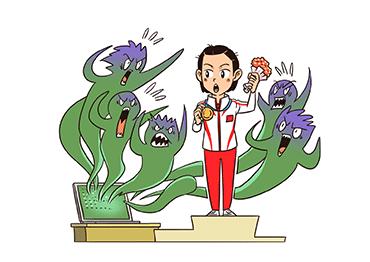Deng Yaping, China’s first table tennis Grand Slam champion: “It’s fine to be fond of a particular athlete who may lead you to love the sport. More importantly, they may motivate you to participate in the sport in a positive way. However, being a fan of someone doesn’t legitimize attacking others, especially those on the same team competing to bring glory to the same country.” Source: Xinhuanet
Li Xiaoxia, former table tennis world champion and professor at Shenyang University’s athletics institute: “After winning Olympic gold in Tokyo three years ago, Chen Meng was dispirited by the harsh online criticism, which negatively impacted her state of mind. But over the past three years, she has matured, focusing on improving her technique above all else. I’ve observed her growth each time we’ve spoken.” Source: Tencent Video
Su Shiyi, video commentator with Beijing News: “No player benefits from harsh denigration and mean provocation, both on and off the court. Toxic fan culture contradicts Olympic sportsmanship and tarnishes the spirit of athletics. When hostility escalates into cyber violence, the abuse and groundless accusations online can violate laws and regulations.” Source: Beijing News
When Chinese table tennis player Chen Meng defeated her teammate Sun Yingsha 4-2 in the final on August 3 during the Paris Olympics, the defending Olympic champion faced barrages of verbal abuse from Sun’s supporters both on and off the court.
Many spectators at the Arena Paris Sud stadium were bewildered by the overwhelming one-sided support for top seed Sun, as both players represent the same country. Chen also suffered abuse from Sun’s fans on Chinese social media platform Sina Weibo, where some also targeted women’s team head coach Ma Lin.
This is not Chen’s first encounter with public ire. During the 2020 Tokyo Olympics, Chen endured similar online abuse after beating Sun to claim gold. The hostility was so intense that Chen temporarily withdrew from women’s singles tournament play, which nearly cost her the Olympic slot, former Chinese table tennis champ Li Xiaoxia told Tencent Video on August 3.
However, 30-year-old Chen, the oldest defending Olympic champion in the history of China’s women’s table tennis, has since steeled herself against toxic fan culture. She rallied in Paris, launching an effective strategy against Sun: Chen consistently returned Sun’s forehand serve to her backhand, confining her movements before executing sudden, decisive strikes.
After her victory, Chen was modest, embracing Sun and thanking all the spectators, including Sun’s fans. In stark contrast to the rude behavior of some fans, one of whom raising their middle finger at her, Chen’s sportsmanship shone through.
Chinese media supported Chen by criticizing the abusive fans, and more than 300 accounts on Weibo were temporarily or permanently banned for spreading rumors or making inappropriate remarks about Chen’s victory. At a May work conference in Beijing, the National General Administration of Sports condemned all forms of “distorted fan culture” that harasses athletes and tarnishes the country’s sportsmanship.
Many on social media also voiced their support for Chen. A post on China’s Instagram-like platform Xiaohongshu (RED) attributed the cyber violence to Chen’s introverted personality, which perhaps makes her an easier target. Other posts highlighted the strength and inner resolve that enabled her to win her second Olympic gold.

 Old Version
Old Version